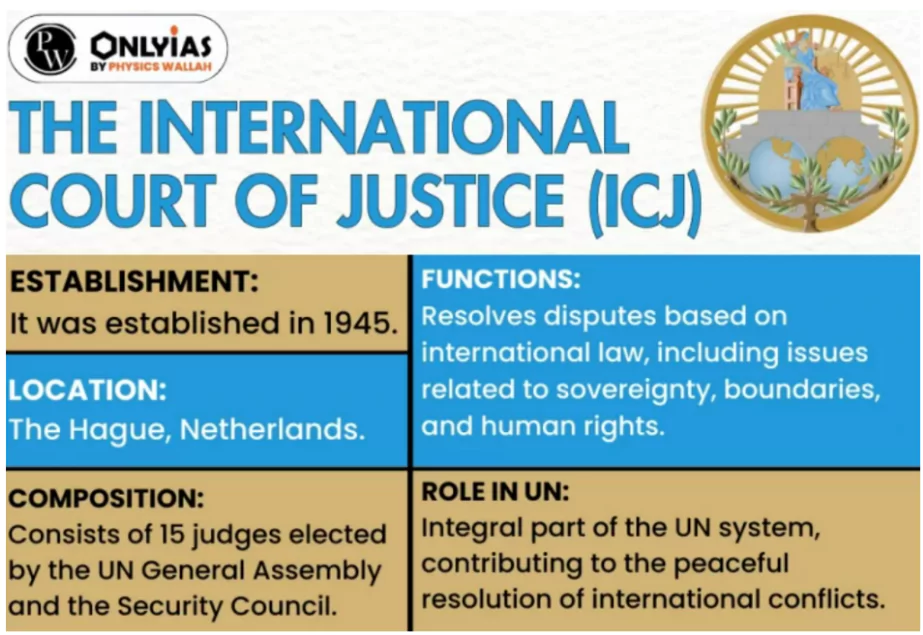The International Court of Justice (ICJ) is set to provide an advisory opinion on December 2, 2024, concerning the legal obligations of states to combat climate change.
International Court of Justice (ICJ)
- The ICJ, also known as the World Court, is the principal judicial organ of the United Nations (UN) and established in June 1945 by the Charter of the UN.
- The ICJ has two types of jurisdictions – contentious and advisory.
- Contentious jurisdiction: It refers to resolving legal disputes between consenting states, under advisory jurisdiction.
- The court’s judgments in contentious cases are final and binding on the parties to a case, and without appeal.
- Advisory jurisdiction: It can issue an advisory opinion on a legal question referred to it by aUN body or specialized agency.
- Unlike decisions given under the contentious jurisdiction, the ICJ’s advisory opinions are essentially non-binding.
|
About the News

- Global Demand for Legal Clarity: There is a widespread international demand for clear guidelines on climate commitments, particularly from countries most at risk from climate change, like small island states.
- Appeal by Vulnerable Nations: Among the 62 nations that petitioned the ICJ for an advisory opinion on climate accountability are island nations from Oceania, Micronesia, and the Caribbean, such as Antigua and Barbuda, El Salvador, Grenada, Saint Lucia, and Saint Vincent and the Grenadines.
- Notably, India did not join this group, although neighboring countries like Pakistan, Sri Lanka, and Bangladesh did.
- No Legally Binding Climate Commitments: Currently, global efforts to mitigate climate change are not legally enforceable, leaving a significant gap in ensuring international accountability.
- Earlier Efforts:
- Tuvalu: The Pacific nation of Tuvalu (part of Oceania) decided to approach the ICJ in a historic claim against Australia in the first such case in 2002.
- Vanuatu: In 1991, another Pacific nation of Vanuatu championed the cause of island nations by taking up the first Chair of the Alliance of Small Island States (AOSIS).
- Its efforts culminated with the inclusion of insurance for the loss and damage due to climate change in the agenda of the UNFCCC.
- On August 16, the ICJ announced its intention to consider various arguments before issuing its advisory opinion in December. These arguments include:
- State Obligations: Responsibilities of states under international law to protect the climate system for current and future generations.
- Legal Consequences: Potential legal outcomes for states failing to meet these obligations.
- Vulnerability of Island States: Particular attention to small island developing states, which are most vulnerable to climate change.
- Impact on Future Generations: Consideration of the effects of climate change on present and future populations.
Enroll now for UPSC Online Course
Nature of the Advisory Jurisdiction.
- Non-Binding Opinion: The ICJ’s advisory opinions are not legally binding. However, they carry significant weight in guiding international law and influencing state behavior.
- Clarification of International Law: These opinions help clarify international law, contributing to its development and the strengthening of peaceful relations between states.
- Influence on Policy: Although non-binding, advisory opinions can influence national and international policies by providing a legal interpretation of states’ obligations.
- Flexibility for Implementation: The entities requesting the advisory opinion are free to decide how to implement the ICJ’s guidance, offering flexibility in its application.
Concerns of Island States
- High Vulnerability: Island nations are highly susceptible to the adverse effects of climate change, such as rising sea levels and extreme weather events.
- Existential Threats: Some island nations, like Tuvalu, face the possibility of being completely submerged by rising ocean levels within a few decades.
Small Island Developing States (SIDS)
- SIDS encompass 39 States and 18 Associate Members of United Nations regional commissions, facing unique social, economic, and environmental vulnerabilities.
- SIDS are situated across three regions:
- the Caribbean,
- the Pacific
- the Atlantic, Indian Ocean, and South China Sea (AIS).
- SIDS were recognized as a special case both for their environment and development at the 1992 UN Conference on Environment and Development held in Rio de Janeiro, Brazil.
|
- Lack of Global Attention: These nations often do not receive adequate attention on the global stage due to their limited political and economic influence.
- Climate Injustice: Island states have historically contributed the least to global emissions but are among the most affected, leading to calls for greater accountability from larger nations.
- Advocacy for Accountability: Many island nations are advocating for the ICJ’s advisory opinion to enforce international climate commitments and protect their existence.
Check Out UPSC CSE Books From PW Store
Way Forward
- Enhanced Global Accountability: The ICJ’s opinion could pave the way for stronger international mechanisms to hold states accountable for their climate actions.
- Support for Vulnerable Nations: The international community must prioritize the needs of small island states, ensuring they receive adequate support to combat climate change.
- Further Legal Developments: The advisory opinion may act as a catalyst for future binding agreements on climate action, addressing the gaps in the current international legal framework.
![]() 24 Aug 2024
24 Aug 2024
